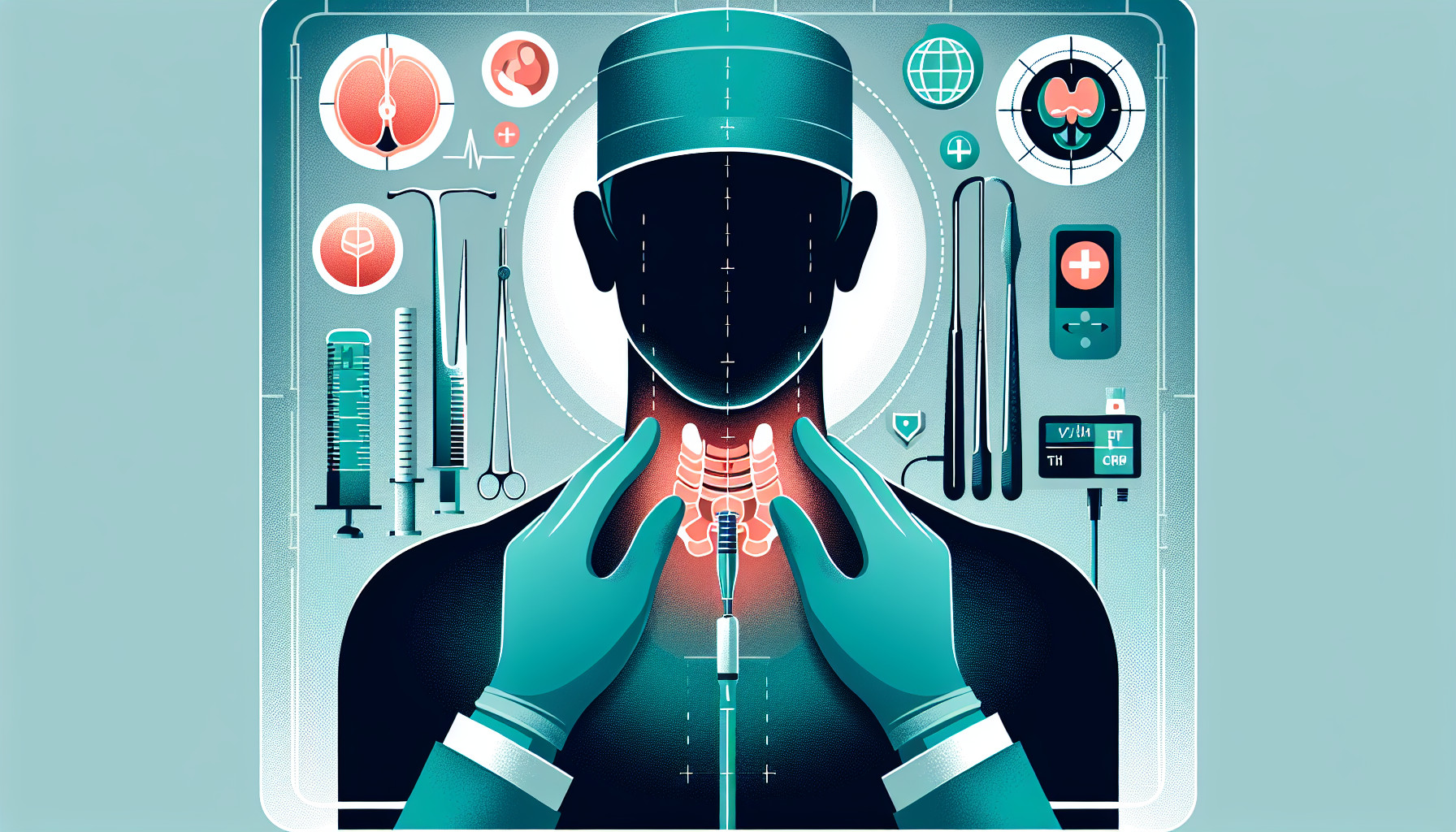Our Summary
This research paper is about a study conducted on the unintentional removal of parathyroid glands during thyroid surgery. The parathyroid glands help control the amount of calcium in our bodies. From January 2013 to June 2015, 341 patients (66 male and 275 female) who needed thyroid and specific lymph node surgery were observed. Their parathyroid hormone levels were checked before surgery and then three more times: the day after, one week after, and three months after surgery.
The researchers found that in about 10% of the cases, a parathyroid gland had been accidentally removed during surgery. Most of the time, only one gland was removed, but in a few cases two had been removed. None of the patients had three or more glands removed. The researchers noticed that the likelihood of accidentally removing a parathyroid gland was much higher when the neck surgery involved the side of the neck.
The unintentional removal of the parathyroid gland didn’t seem to be related to the patient’s age, gender, or symptoms after surgery. However, it seemed likely to cause a temporary decrease in parathyroid hormone levels, which could affect calcium levels in the body. The researchers suggest that surgeons should make an effort to protect the parathyroid glands during surgery, especially when operating close to the thymus, an organ that sits in front of the heart and plays a role in the immune system.
FAQs
- What percentage of the time are parathyroid glands accidentally removed during thyroid surgery?
- Does the unintentional removal of the parathyroid gland during surgery affect parathyroid hormone levels?
- What factors were found to increase the likelihood of accidentally removing a parathyroid gland during surgery?
Doctor’s Tip
One helpful tip a doctor might tell a patient about parathyroidectomy is to make sure to follow up with blood tests to monitor calcium and parathyroid hormone levels after surgery. This will help ensure that any potential issues with calcium regulation are promptly identified and managed. Additionally, patients should be aware of the signs and symptoms of low calcium levels, such as muscle cramps, tingling in the hands and feet, and changes in mood, and seek medical attention if they experience any of these symptoms.
Suitable For
Patients who are recommended for parathyroidectomy are those who have hyperparathyroidism, which is a condition where the parathyroid glands produce too much parathyroid hormone. This can lead to high levels of calcium in the blood, causing symptoms such as fatigue, weakness, kidney stones, and bone pain. Parathyroidectomy is typically recommended for patients with severe symptoms, high levels of calcium in the blood, or complications such as kidney stones or bone loss. Additionally, patients with parathyroid cancer or enlarged parathyroid glands may also be candidates for parathyroidectomy.
Timeline
Before Parathyroidectomy:
- Patient is diagnosed with a condition that requires thyroid and specific lymph node surgery
- Parathyroid hormone levels are checked before surgery
- Surgery is performed, potentially leading to unintentional removal of parathyroid glands
- Patient may experience temporary decrease in parathyroid hormone levels
After Parathyroidectomy:
- Parathyroid hormone levels are checked the day after surgery, one week after surgery, and three months after surgery
- Researchers find that in about 10% of cases, a parathyroid gland was accidentally removed during surgery
- Likelihood of unintentional removal is higher when surgery involves the side of the neck
- Accidental removal does not seem to be related to age, gender, or symptoms after surgery
- Surgeons are advised to make an effort to protect the parathyroid glands during surgery, especially when operating close to the thymus.
What to Ask Your Doctor
- What is the purpose of a parathyroidectomy and why do I need this surgery?
- What are the potential risks and complications associated with parathyroidectomy?
- How will the surgery affect my calcium levels and overall health?
- How many parathyroid glands do I have and what is the likelihood of accidentally removing them during surgery?
- Will the unintentional removal of a parathyroid gland have long-term consequences on my health?
- How will my parathyroid hormone levels be monitored after surgery and what should I expect in terms of follow-up care?
- Are there any specific precautions or lifestyle changes I should make post-surgery to support my recovery and maintain proper calcium levels?
- What is the success rate of parathyroidectomy in treating my condition and what are the expected outcomes?
- Are there any alternative treatment options to consider before proceeding with surgery?
- How experienced is the surgical team in performing parathyroidectomy and what steps will be taken to prevent accidental removal of the parathyroid glands during surgery?
Reference
Authors: Du W, Fang Q, Zhang X, Cui M, Zhao M, Lou W. Journal: Medicine (Baltimore). 2017 Mar;96(11):e6411. doi: 10.1097/MD.0000000000006411. PMID: 28296787
